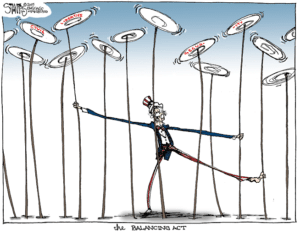While 2020 has been a tough year for civil liberties, the silver lining is growing as an end to civil forfeiture and the Patriot Act are on the horizon.
If they got out of those rackets, the United States would not only be much freer, it would be economically soaring.
Alas, despite volumes of evidence, the government insists it needs more of those things to oppress us into prosperity or equality or whatever the new benchmark is.
Slowly we are seeing challenges to these norms, which is nice! For example, we are seeing movement away from drug prohibition. This is good! Albeit there seems to be strings attached, it does roughly show policy catching up to public demand.
Earlier this year, we addressed how COVID-19 was exposing some politicians’ true colors. If you recall, Arizona had a civil forfeiture reform bill that had already passed the state and set to pass without issue in February.
It suddenly got shot down. Is it because the police department relies on this tool to get those no-goodniks off the streets and keep us all safe? No. They couldn’t afford the loss in revenue.
As many of these euphemistic tactics start exposing themselves for the theft rackets they are, some people with some modicum of conscience push to change things.
A few such people in the US congress include Justin Amash, Tulsi Gabbard, and Tom Massie.
All three have been principled in their criticism of civil forfeiture, and rightly so. It’s a blatant violation of the fifth amendment of the US constitution:
“… nor be deprived of life, liberty, or property, without due process of law; nor shall private property be taken for public use, without just compensation.”
Civil forfeiture is when the police seize your property claiming that the property itself was involved or party to a criminal act, even if the owner was not. So you can be 100% innocent, but the house you just bought could’ve been where a drug deal went down 3 years prior. Wave the civil forfeiture wand, say the magic words, and your house is no longer yours.
Tulsi Gabbard has been both vocal and active against it, pushing and successfully getting stipulations in the congressional budget to prevent those dollars from being used for civil forfeiture.
Justin Amash recently went straight for the jugular, not just calling for reforms or amendments, but rather the total nationwide elimination of the practice:
“Today, I introduced the Civil Asset Forfeiture Elimination Act to repeal civil asset forfeiture nationwide. Its history is riddled with injustices not because it’s a valid practice that gets misused, but because its central premise is inherently flawed and unconstitutional.”
It’s a clean bill. No tinkering. No loopholes. Declaring it unconstitutional would also mean that is would abolish the practice at the state and local levels as well.
Of course that could also mean it doesn’t stand a snowball’s chance in hell of passing either. But society knows better than congress. Society was fed up with Jim Crow before the government finally caught up. Society was fed up with prohibition before the government finally caught up. And society is fed up with the absence of due process.
The fact is, while police unions insist this is essential for the safety of society, it really isn’t. New Mexico tried it:
“[I]n 2015, New Mexico completely (and unanimously) abolished the practice and replaced it with criminal forfeiture, which requires a criminal conviction to forfeit property. Just as important, New Mexico banned agencies from padding their budgets with forfeiture revenue, and instead directed all proceeds to the general fund.”
Naturally, their police departments cried out that they were all but handing the state over to the drug cartels. Nothing could be further from the truth. Five years later and they are no worse for wear. Crime hasn’t skyrocketed. The streets aren’t streaming with the blood of the innocent.
And that extra measure to ensure that even the criminal forfeiture be directed to the general fund rather than to particular agencies, aims at the heart of “policing for profit”.
2020 has been an interesting year. A year full of civil liberty abominations, but also a host of civil liberty shifts. More laws turning the US away from the drug war. Introduction of bills to abandon civil forfeiture. A louder voice to free or pardon Edward Snowden and Julian Assange.
And a the star on the tree? Thomas Massie and Tulsi Gabbard teaming up to repeal the Patriot Act and reform FISA. Here are a few things we can look forward to:
-
Full repeal of the Patriot Act – This means no more collecting metadata of Americans “because reasons”. You need a warrant and probable cause to start tracking Americans.
-
Repealing the FISA Amendment Act – No more collection of emails
-
Make retaliation against federal whistleblowers, like Edward Snowden, illegal
-
All those technological “back doors” congress and the Alphabet Bois demand from social media and tech companies like Google and Apple would be prohibited.
-
Annual audits by the Government Accountability Office for compliance in all surveillance programs
Indeed, that’s a righteous holiday wish list, but one I think that could bring people together during a time of such division if fully granted.
This is refreshing to see at the end of an otherwise difficult year for so many. Let’s hope the momentum builds and this signifies a turn toward greater freedom in the coming years.


